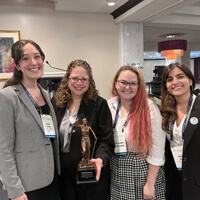Federal Tort Liability After Egbert v. Boule: A Textual Case for Restoring the Officer Suit at Common Law
Throughout the nineteenth century and much of the twentieth, remedies for federal government misconduct were predicated on rights to sue conferred by such common law forms astrespass, assumpsit, and ejectment. But Erie, merger, and the rise of statutes pushed those common law forms to the side. In 1946, Congress adopted the Federal Tort Claims Act (FTCA), imposing vicarious liability on the federal government for many of the torts of its officers and employees.Then, in the 1970s, the Supreme Court recognized federal common law rights to sue officers for certain Fourth, Fifth, and Eighth Amendment claims. Individuals seeking redress from the federal government now pursue claims under the Bivens doctrine, the FTCA, or both.
Yet Bivens and the FTCA do not provide assured redress. In Hernandez v. Mesa (2020), the Court declined to recognize a right to sue under the Bivens doctrine even though all agreed that the FTCA did not apply to injuries the plaintiffs had suffered across the border in Mexico. Similar remedial gaps have opened across a wide spectrum of government misconduct: members of the military and other federal agencies cannot recover for sexual assault and harassment on the job and individuals have no effective remedy for torture inflicted at the hands of federal government officials. In Egbert v. Boule (2022), the Court confirmed that the Bivens doctrine, lacking a textual foundation, has no gap-filling growing power.
Channeling the textualism of Egbert, this Article calls for the restoration of common law claims as one important solution to gaps in government accountability. In so doing, we rectify a fundamental error in the way federal courts define the immunity conferred by the FTCA’s Westfall Act. Contrary to present doctrine, which holds that the Westfall Act precludes all common law claims against federal officers that arise from conduct within the scope of their employment, we show that the FTCA applies more narrowly to claims that implicate the “subject matter” of the FTCA. Reclaiming the “subject matter” limits on the scope of preclusion through a close reading of the statute, we show that the Westfall Act preserves the right of victims to sue individual officers for many intentional torts. The Article concludes by sketching the many ways intentional tort litigation can revive the system of government accountability as the sun sets on the Bivens doctrine.
About the Public Law Workshop
Michigan’s Public Law Workshop provides an opportunity for faculty and students from across the University to enjoy weekly presentations by leading scholars producing current work on topics ranging from constitutional law and administrative law to international law, statutory interpretation and beyond. Professors Julian Mortenson and Maureen Carroll organize the workshop. If you would like to receive workshop announcements, please contact Alex Wroble ([email protected]) and ask to have your name added to the workshop’s email list.






